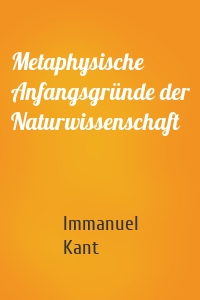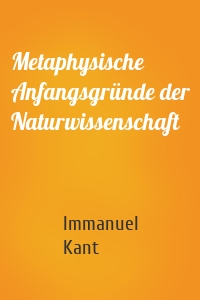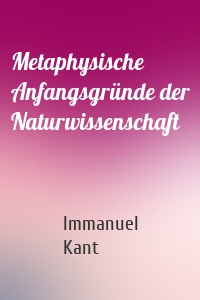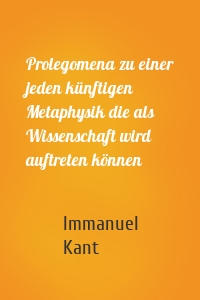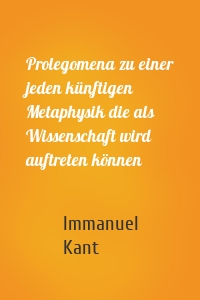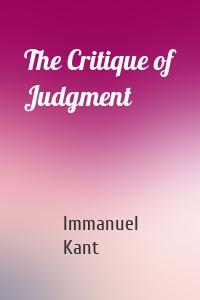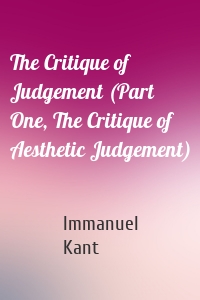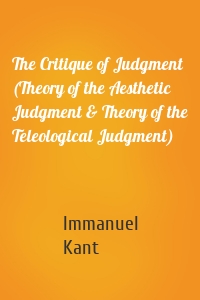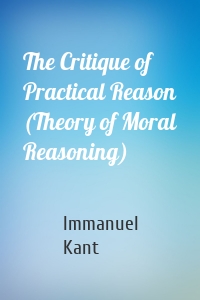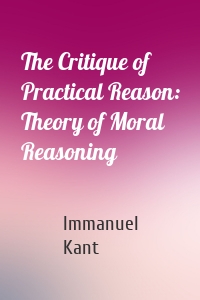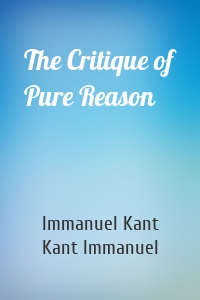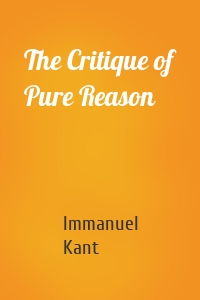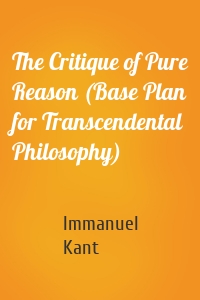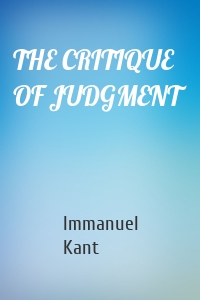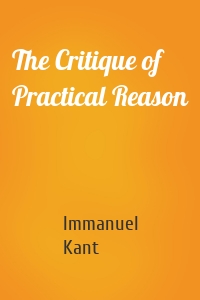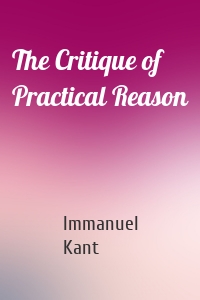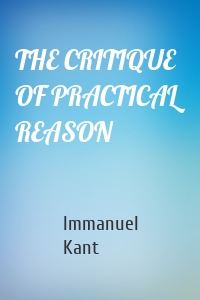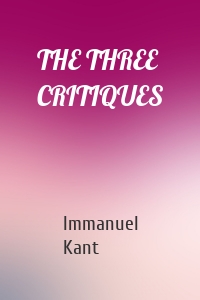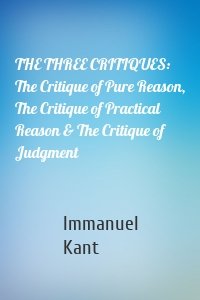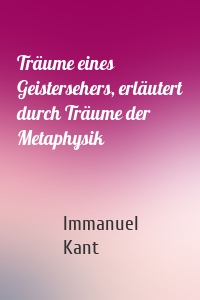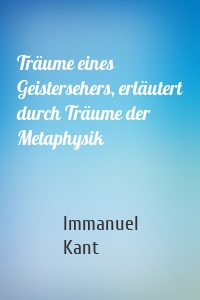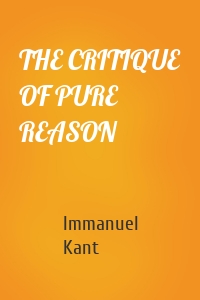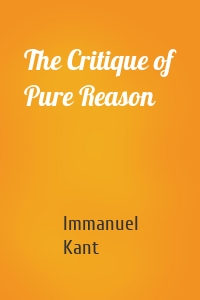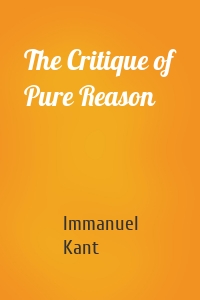Immanuel Kant
115 кн.
Prolegomena zu einer jeden künftige...
Diese Ausgabe wurde mit einem funktionalen Layout erstellt und sorgfältig formatiert. Folgende Fragen stehen im Zentrum: Wie ist reine Mathematik möglich? – Kant entwickelt seine Lehre von der transzendentalen Idealität von Raum und Zeit. Kurzgefasst besagt diese, dass Raum und Zeit nicht real, d. h. nicht unabhängig vom Menschen existieren: Sie stellen vielmehr die Grundbedingung aller sinnlichen Erfahrung dar, sind gewissermaßen eine Art Linse oder Brille, mit der wir auf die...
| Автор | Immanuel Kant |
The Critique of Judgment
The Critique of Judgment, also translated as the Critique of the Power of Judgment and more commonly referred to as the third Critique, is a philosophical work by Immanuel Kant. Critique of Judgment completes the Critical project begun in the Critique of Pure Reason and the Critique of Practical Reason (the first and second Critiques, respectively). The book is divided into two main sections: the Critique of Aesthetic Judgment and the Critique of Teleological Judgment, and also includes a large...
| Автор | Immanuel Kant |
The Critique of Judgement (Part One...
Contained in this volume is the first part of Immanuel Kant's «Critique of Judgement», which is subtitled «The Critique of Aesthetic Judgement» and in which Kant discusses aesthetics and how as humans we decide what is beautiful and how in turn we respond to that beauty. Immanuel Kant, considered by many to be one of the most important philosophers of all time gives us much to consider on the nature of beauty in this intriguing exposition on the subject.
| Автор | Immanuel Kant |
THE CRITIQUE OF JUDGMENT
The Critique of Judgment, also translated as the Critique of the Power of Judgment and more commonly referred to as the third Critique, is a philosophical work by Immanuel Kant. Critique of Judgment completes the Critical project begun in the Critique of Pure Reason and the Critique of Practical Reason (the first and second Critiques, respectively). The book is divided into two main sections: the Critique of Aesthetic Judgment and the Critique of Teleological Judgment, and also includes a large...
| Автор | Immanuel Kant |
The Critique of Practical Reason
The Critique of Practical Reason is the second of Immanuel Kant's three critiques. It follows on from Kant's Critique of Pure Reason and deals with his moral philosophy. The second Critique exercised a decisive influence over the subsequent development of the field of ethics and moral philosophy, beginning with Johann Gottlieb Fichte's Doctrine of Science and becoming, during the 20th century, the principal reference point for deontological moral philosophy. Immanuel Kant...
| Автор | Immanuel Kant |
The Critique of Practical Reason
"The Critique of Practical Reason" is considered by many to be one of the most important works on the subject of moral philosophy ever written. In this work Immanuel Kant puts forth his philosophy of the categorical imperative, a rule for behavior that applies universally. Kant argues that a categorical imperative must guide whatever maxim one establishes for dealing with all decisions with moral implications. «The Critique of Practical Reason» is an excellent work on the philosophy of...
| Автор | Immanuel Kant |
THE CRITIQUE OF PRACTICAL REASON
The Critique of Practical Reason is the second of Immanuel Kant's three critiques. It follows on from Kant's Critique of Pure Reason and deals with his moral philosophy. The second Critique exercised a decisive influence over the subsequent development of the field of ethics and moral philosophy, beginning with Johann Gottlieb Fichte's Doctrine of Science and becoming, during the 20th century, the principal reference point for deontological moral philosophy. Immanuel Kant...
| Автор | Immanuel Kant |
THE CRITIQUE OF PURE REASON
The Critique of Pure Reason is one of the most influential works in the history of philosophy and marks a turning point and the beginning of modern philosophy. Also referred to as Kant's «first critique,» it was followed by the Critique of Practical Reason and by the Critique of Judgment. In the preface to the first edition, Kant explains what he means by a critique of pure reason: «I do not mean by this a critique of books and systems, but of the faculty of reason in general, in respect of...
| Автор | Immanuel Kant |
The Critique of Pure Reason
This eBook edition of «The Critique of Pure Reason» has been formatted to the highest digital standards and adjusted for readability on all devices. The Critique of Pure Reason is one of the most influential works in the history of philosophy and marks a turning point and the beginning of modern philosophy. Also referred to as Kant's «first critique,» it was followed by the Critique of Practical Reason and by the Critique of Judgment. In the preface to the first edition, Kant explains what...
| Автор | Immanuel Kant |
The Critique of Pure Reason
A pivotal piece of philosophical literature, «The Critique of Pure Reason» is quite likely Immanuel Kant's greatest work. Kant was a professor of philosophy in the German city of Konisberg during the late 1700s. It was during that time that he penned several works based on his philosophical beliefs of which the greatest is often considered to be this work. Considered by many as one of the most important works of philosophy ever written, «The Critique of Pure Reason» puts forth Kant belief...
| Автор | Immanuel Kant |


